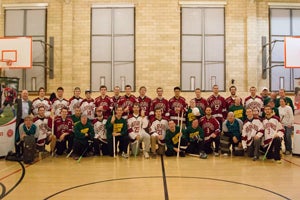In November, the Harvard Law School Project on Disability hosted the fall meeting of the Special Olympics International (SOI), under the direction of board member and Harvard Law School Professor William Alford, who has worked for more than two decades with SOI. This year’s meeting focused on the future of the Special Olympics Unified Sports® program, which joins people with and without intellectual disabilities on the same team, and considered how Unified Sports will transform the Special Olympics movement, with the goal of creating social inclusion through sports.
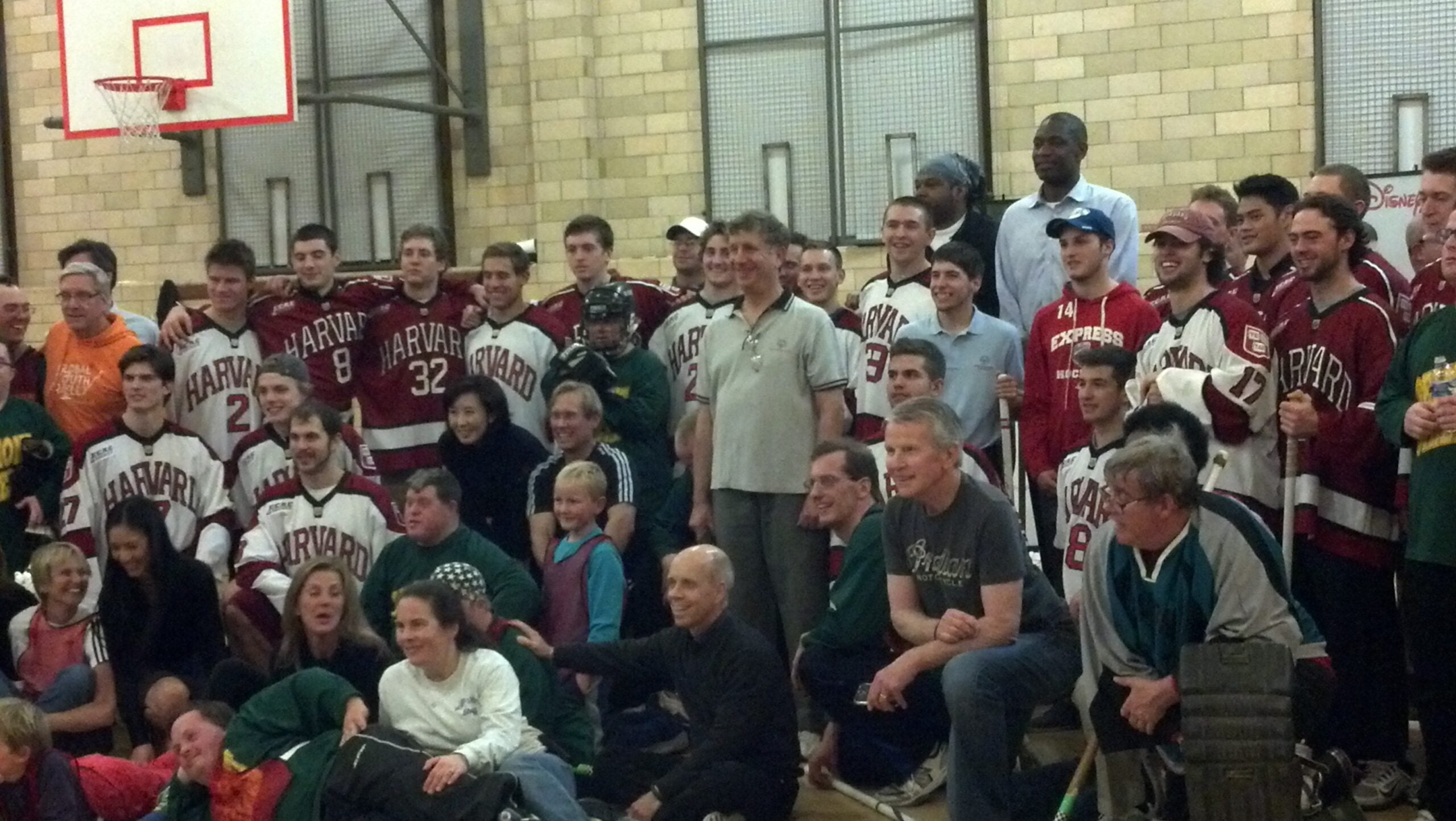
Alford, who is the vice dean for the Graduate Program and International Legal Studies and chair of the Harvard Law School Project on Disability, kicked off the two-day event on Nov. 11, welcoming board members, including several sports legends, to the law school for a floor hockey game with Special Olympic athletes and Harvard athletes, and a panel discussion on disability.
Alford said: “Special Olympics is an extraordinary movement engaged in a host of wonderful programs that provide athletic opportunities, medical care, educational and public awareness materials, and much more—all free of charge—to millions of people in more than 170 countries. I can not begin to tell you how enriching it has been for me to have been a small part of this movement and I am delighted to have been able to bring it and Harvard closer together.”
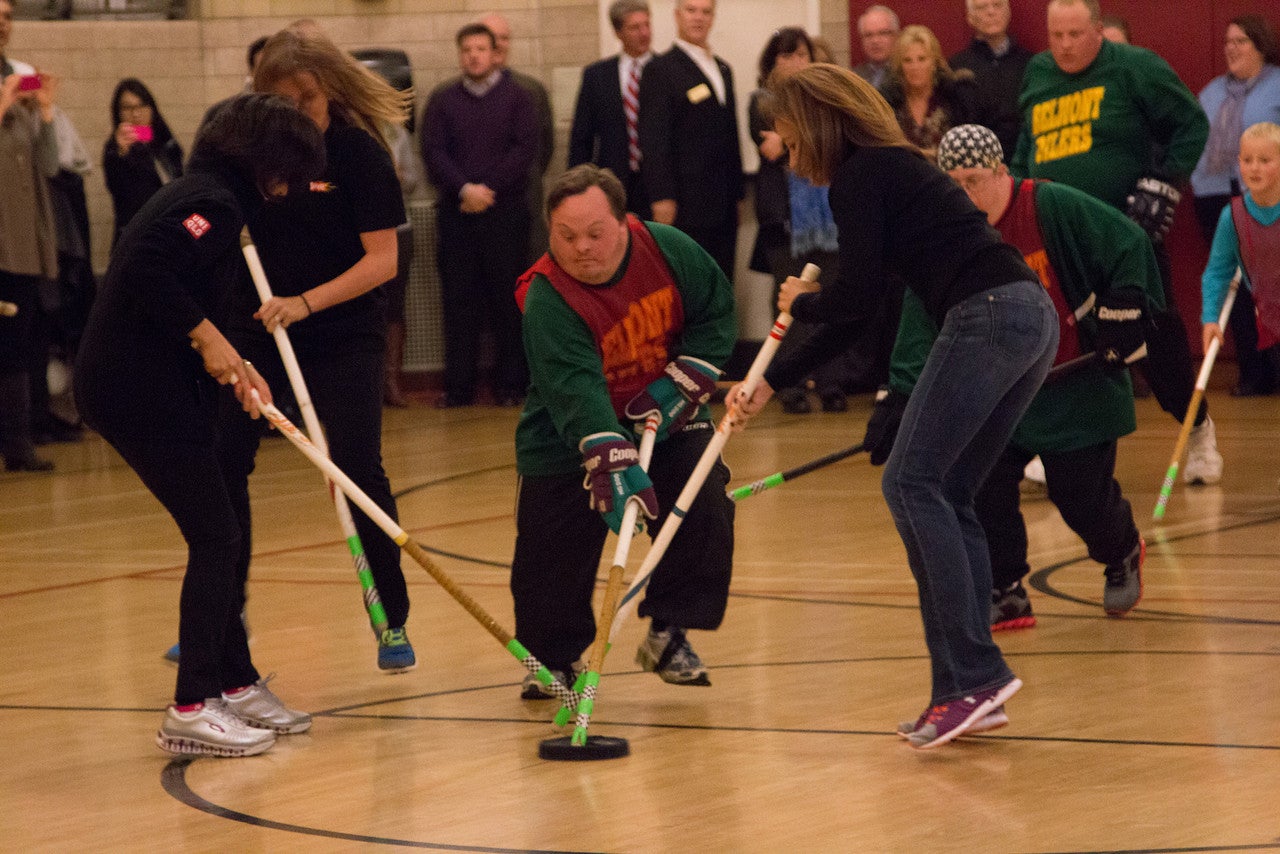
At HLS’s Hemenway Gymnasium, athletes from Special Olympics Massachusetts and members of the Harvard Men’s Varsity Ice Hockey team gathered for a game of floor hockey. Some members of the team, which is coached by former NHL player Ted Donato, have served as Special Olympics volunteers. Also on the court for the Special Olympics Unified Sports program were SOI board members, including Michelle Kwan, two-time Olympic medalist in figure skating; Bart Conner, a member of the gold medalist men’s gymnastics team at the 1984 Summer Olympic Games; Dikembe Mutombo, former basketball player for the Houston Rockets; Sam Perkins, who won a NCAA championship, an gold medal with the US national basketball team at the 1984 Los Angeles Olympics and an NBA championship; and Scott Hamilton, the American figure skater who won a gold medal in 1984, as well as Professor Alford, SOI Chair Dr Timothy Shriver, and SOI President and CEO Janet Froetscher.
Following the game, Alford hosted a dinner reception for 175 guests and moderated a panel discussion in the law school’s Wasserstein Hall, Caspersen Student Center, Clinical Wing building. The discussion, titled “Disability and Unified,” included panelists Matthew Millett, Special Olympics Massachusetts athlete and Hall of Fame member; Michelle Kwan; Michael Ashley Stein, executive director, Harvard Law School Project on Disability; and Thomas Hehir, director, Special Studies Program, Silvana and Christopher Pascucci Professor of Practice in Learning Differences at Harvard Graduate School of Education.
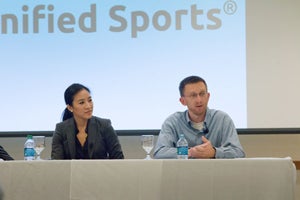
The general consensus of the panel was that Unified Sports offers society a way to understand that disability is natural and that all people are valued and have something to contribute.
The following day, on Nov. 12, Boston Red Sox President and CEO and Special Olympics Board Director Larry Lucchino graciously hosted board members at historic Fenway Park for the official board meeting itself. This was followed by a lecture and performance at HLS by SOI board member Eddie Barbanell who co-starred in The Ringer with Johnny Knoxville.
The Special Olympics International Board of Directors is the ultimate governing authority for the Special Olympics movement and is composed of leaders in the areas of business, government, disability, sports and entertainment. The board is responsible for the global affairs and strategies of Special Olympics; determines its policies and programs and oversees all top-level management.
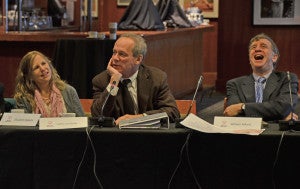
Alford is the Henry L. Stimson Professor at Harvard Law School and director of East Asian Legal Studies. His most recent book (with William Kirby and Kenneth Winston) is “Prospects for the Professions in China” (2011). In the early 1980s, he founded the first academic program on U.S. law in the history of the People’s Republic of China. In 2007, in his role as chair of the Harvard Law School Project on Disability, with Dr. Michael Stein ’88, he organized the People’s Republic of China’s first conference on disability law, in conjunction with Renmin University of China and the China Disabled Persons’ Federation.
The Harvard Law School Project on Disability works to promote the human rights of people with disabilities worldwide. HPOD supports the development of disability civil society, informs innovative legislative and policy development, provides legal advice and human rights training to persons with disabilities, their representative organizations, non-governmental organizations, National Human Rights Institutions, and governments. As a global disability law and policy center, HPOD undertakes and encourages teaching and groundbreaking scholarship on disability rights.
